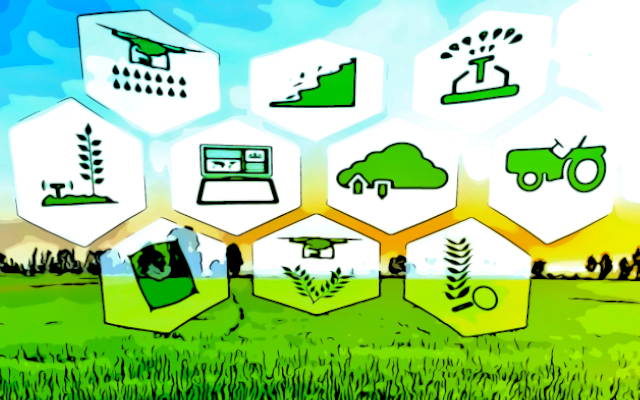Italian agriculture 4.0. Manifesto and scenario are presented at theInnovation Day, on 28.5.20/XNUMX/XNUMX, in streaming. Under the direction of Coldiretti, Filiera Italia and Bonifiche Ferraresi. Useful food for thought to follow.
Food shopping and digital innovation
Il lockdown imposed by Covid-19, as seen, has put platforms in crisis website of the GDO in Italy. Sales growth online of food has peaked at + 178% in recent weeks, although containment measures have already reached stage 2.
Italian consumers, overcome theirs historical hesitations towards’ecommerce food, they learned to plan their shopping on a weekly basis. Without giving up fresh and very fresh foods, which have a fundamental role in the Mediterranean diet. With the advantage of saving time and queues, as well as the convenience of home delivery.
The next step it will be the use of new devices – not only that smartphone, but also smart speakers including Google Home e Google Assistant, Alexa ed Echo (Amazon), Apple HomePod – to know the products and order the shopping, as well as for home automation and entertainment. In an interactive communication path, already introduced for years by the IT giants (Information Technology), which hopefully will soon be enriched by tailor-made applications, to guarantee the purchase of 100% products Made in Italy: da short supply chain , equivalent and sustainable.
Italian agriculture 4.0
Italian agriculture 4.0 it is a reality already in the making. The solutions and services offered byprecision farming recorded double-digit growth, with a turnover of € 450 million (2019, + 22% compared to 2018). Investments focus on production monitoring and control systems (49%), equipment and with management (34%) surface mapping and data collection technologies (14%. Coldiretti processing on Smartagrifood data).
The technology it can contribute to reducing the ecological footprint of production by reducing input agronomic and process efficiency. With optimization of work in the fields, increase in yields and margins, attenuation of fragility (thanks also to the availability of agrometerological indices and the forecast of their variations). In addition to offering new guarantees in terms of origin, safety and quality, sustainability.
The adoption of technology ‘in the field’ can make it possible to collect – and share in real time – all the data useful for qualifying suppliers on the various distribution channels. And guarantee consumers the ability to make effectively informed choices. In line, among other things, with the Sustainable Development Goal (SDG) n. 12, in the UN Agenda 2030. Sustainable production and consumption, in fact. Without neglecting the opportunities of transparency in the value chain, for too long invoked only in words, indispensable to guarantee an equitable remuneration of the primary agricultural chain.
Interactive communication from farm to fork it also represents an engine of social innovation under both aspects of:
– direct sales and disintermediated, or almost. Freeing the Italian agri-food chain from the global Amazon monopoly, which drains commissions out of the market with respect to industry practices. Without contributing to the tax revenues on income produced in Italy (beyond a miserable web tax, 3%, introduced only starting from 2020). To transfer our savings abroad,
– stimulate evolution of the agri-food market on the basis of requests from consumers (consumer demand pull), rather than the pressures of distribution (supply push). From the supply chain leaders to the value chain, i.e. from the supply chain to the value chain. In a path of collaboration and shared growth, capable of redistributing value and wealth between those who produce and those who consume.
The Manifesto of Italian Agriculture 4.0
The poster of Italian Agriculture 4.0, launched and promoted by the participants in the Innovation Day 28.5.20, is divided into 6 key points:
1) accelerate the digital transition. Reward the adoption of precision technologies, in agriculture and animal husbandry, with projects suitable for preserving the unique characteristics of the Italian territory,
2) provide support to farmers, to facilitate agronomic choices in real time,
3) promote awareness and widespread culture, also among consumers, about the origin and characteristics of agri-food products. By adopting digital technologies to ensure traceability, safety and quality,
4) encourage economic models innovative, which provide for a fair distribution of value throughout the supply chain,
5) support development of digital sales channels for national short supply chains,
6) develop patents based on technologies and standards Made in Italy, at the service of the Italian agri-food chain, to improve its efficiency and effectiveness.
System needs
Vincenzo Gesmundo, secretary general of Coldiretti, underlines the need to democratize digital technologies. An indispensable step to ensure their effective usability by the millions of farms that make up the Italian production chain. The so-called ‘exponentiality’ of some innovations, with a disruptive effect on the reference markets (eg. Amazon, Airbnb, etc.), makes many strategies obsolete, even in politics. The same Communication from the European Commission ‘Shaping the digital future of Europe’, of 19.2.20, risks being overtaken by events.
Pragmatism it also requires to consider – in the opinion of the writer (Dongo) – three system needs:
– blockchain public. Only authentic systems of blockchain public (ex. Wise Chain), as distributed and decentralized, can and must guarantee the digital and incorruptible notarization of data,
– interoperability. The system must be accessible and interact with the various ERP systems (enterprise resource planning) used by the various operators. In order to make it possible for all the players in the supply chain to participate and collaborate, whatever the with used (from Ms or Open Office to SA400, SAP, etc.). Without forcing all those who participate in the network to face the costs of adapting their databases to a closed system,
– global standard. GS1, the only body authorized to issue barcodes, developed the GS1 Digital Link. An address website built according to international standard, inter-operational with all kinds of data carrier (one-dimensional and two-dimensional barcodes, eg. QR Code, tag RFID and other technologies). Scan this code with one smartphone, or other devices allows you to access all the information encoded in the Global Standard of GS1. From GTIN (Global Trade Item Number) inserted in the classic barcode on the product sheet on the manufacturer’s website or on the portal ecommerce, etc.
Technological needs
Technological innovation will soon become part of the supply chain agreements, in a logic of vertical integration (from farm to fork) and horizontal (of cooperation between the supply chains, also with a view to sharing technologies and resources). The Italian agri-food sector is today facing two urgent technological needs, as highlighted in theInnovation Day by Antonio Samaritani, CEO of Abaco Group:
– coverage with ultra-broadband in all rural areas, an indispensable prerequisite for digital applications in agriculture throughout the Italian territory,
– an Agriculture 4.0 platform, where to collect and manage data on weather forecasts and temperatures, soil fertility, water stress, etc.
The Demetra application It was created by Abaco Group for Member’s Portal of Coldiretti, the first agricultural confederation in Europe by number of members (1,6 million, equal to 70% of agricultural enterprises registered with the Italian Chambers of Commerce). And it could form the basis for the digitization of Italian agricultural enterprises, where to graft vertical supply chain projects.
Filiera Italia
The agri-food chain in Italy – from the fields to the table, passing through industry, distribution and catering – it contributes 25% of the national GDP (€ 538 billion) and 3,7 million employees. To which must be added the € 11,4 billion turnover of agricultural machinery (of which 70% export. FederUnaComa 2019 data) and the € 5,4 billion of the machinery, plant and equipment industry (66% export. Assofoodtec 2019 data).
Luigi Scordamaglia, managing director of Filiera Italia, intervenes in theInnovation Day highlighting the need to invest in technology and IT to ‘a healthier and more sustainable agri-food sector’, in line with the European strategy Farm to Fork (f2f). Preserving the relationship with nature, also referred to in EU biodiversity strategy and the quality rooted in traditions and territories.
Digitization, eco-sustainable packaging, enhancement of by-products in a logic of circular economy are areas of development to be considered. As well as research on the health properties of natural ingredients. Without debasing the role of agriculture with technocratic ‘solutions’ in the hands of a few, such as Lab meat.
Federico Vecchioni, CEO of Bonifiche Ferraresi, in turn insists on the need to combine tradition and innovation, ‘aware of the fact that the true value lies in the hands of the farmers and is the origin of the product’. The Bonifiche Ferraresi platform today represents the most important example of the introduction of precision agriculture, on an area of over 8.500.
Innovation, startup Italians in the shop window
THEInnovation Day of 28.5.20, in the second part, showcases some startup innovative companies and companies at the service of Italian agriculture 4.0.
Agrorobotics (Tuscany) presents spy fly, a ‘robotic trap’ that attracts and captures harmful insects through sexual lures to pheromones, recognizes them through algorithms, signals their concentration on crops.
BlueTentacles (Trentino), Hydroplan (Lazio) and Revotree (Lombardy) propose automated and intelligent irrigation solutions, capable of allowing unimaginable water savings compared to traditional management.
Cynomys (Liguria) has developed IoT solutions (Internet of Things) for the monitoring of environmental conditions in the stables (e.g. temperature, humidity, carbon dioxide, methane, ammonia, hydrogen sulphide, light). BS-company (Emilia-Romagna) offers a variety of management solutions.
Horta (Emilia-Romagna) is one spin off of the Catholic University of Piacenza and Cremona with over ten years of experience in the research and development of innovative solutions for vegetable agricultural production. Precision agriculture and artificial intelligence dedicated to different crops. Xfarm (Lombardy, Canton Ticino) is one startup specialized in building decision-making platforms ad hoc.
I have exponential farming (Veneto) automates crops indoor, from seed to harvest. xnext (Lombardia) offers innovative solutions for on-line inspection of products, using X-rays, microelectronics and artificial intelligence.
edoapp (Emilia-Romagna) is instead an app aimed at consumers. Who, by scanning the barcodes on the labels, can receive information on the suitability of individual products to make up a healthy and balanced diet, also taking into account the presence of unsustainable raw materials (e.g. palm oil) and individual needs (e.g. food allergies and intolerances).
Innovation Day, 28.5.20. The entire conference on YouTube.
Dario Dongo and Pier Luigi Romiti

Dario Dongo, lawyer and journalist, PhD in international food law, founder of WIISE (FARE – GIFT – Food Times) and Égalité.
Expert in economic policy and innovation. Head of Coldiretti’s agri-food supply chain, after long experience in Confagricoltura and Fedagri

